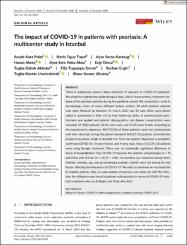| dc.contributor.author | Kara Polat, Asude | |
| dc.contributor.author | Topal, İlteriş Oğuz | |
| dc.contributor.author | Karadağ, Ayşe Serap | |
| dc.contributor.author | Aksoy, Hasan | |
| dc.contributor.author | Koku Aksu, Ayşe Esra | |
| dc.contributor.author | Özkur, Ezgi | |
| dc.contributor.author | Özkök Akbulut, Tuğba | |
| dc.contributor.author | Topaloğlu Demir, Filiz | |
| dc.contributor.author | Engin, Burhan | |
| dc.contributor.author | Uzunçakmak, Tuğba Kevser | |
| dc.contributor.author | Kıvanç Altunay, İlknur | |
| dc.date.accessioned | 2021-03-18T12:37:38Z | |
| dc.date.available | 2021-03-18T12:37:38Z | |
| dc.date.issued | 2021 | en_US |
| dc.identifier.citation | Kara Polat, A., Topal, İ. O., Karadağ, A. S., Aksoy, H., Koku Aksu, A. E., Özkur, E. ... Kıvanç Altunay, İ. (2021). The impact of COVID-19 in patients with psoriasis: A multicenter study in Istanbul. Dermatologic Therapy, 34(1). https://dx.doi.org/10.1111/dth.14691 | en_US |
| dc.identifier.issn | 1396-0296 | |
| dc.identifier.issn | 1529-8019 | |
| dc.identifier.uri | https://dx.doi.org/10.1111/dth.14691 | |
| dc.identifier.uri | https://hdl.handle.net/20.500.12511/6626 | |
| dc.description.abstract | There is widespread concern about treatment of psoriasis in COVID-19 pandemic. We aimed to evaluate the epidemiological data, clinical characteristics, treatment features of the psoriasis patients during the pandemic period. We conducted a study in dermatology clinics of seven different tertiary centers. All adult psoriasis patients who were followed up between 11 March 2020 and 28 June 2020, were phone called or questioned in their visit to their follow-up clinics. A semistructured questionnaire was applied and patients' demographics and disease characteristics were recorded. Of 1322 patients, 52.4% were male, and 47.6% were female. According to the questionnaire responses, 964 (72.9%) of these patients could not communicate with their physician during this period, remained 358 (27.1%) patients contacted the physician by phone, email, or hospital visit. From the patients diagnosed as probable/confirmed COVID-19, 14 were female, and 9 were male. Nine of 23 (39.1%) patients were using biologic treatment. There was no statistically significant difference in terms of hospitalization from COVID-19 between the patients using biologics (n = 9) and those who did not (n = 14) (P = 1.00). No mortality was observed among them. Obesity, smoking, age, and accompanying psoriatic arthritis were not among the risk factors affecting the frequency of COVID-19. We only encountered an increased risk in diabetic patients. Also, an exacerbation of psoriasis was observed with the infection. No difference was found in patients with psoriasis in terms of COVID-19 infection in patients who use biologics and those who don't. | en_US |
| dc.language.iso | eng | en_US |
| dc.publisher | Wiley | en_US |
| dc.rights | info:eu-repo/semantics/openAccess | en_US |
| dc.subject | Biological Therapy | en_US |
| dc.subject | COVID-19 | en_US |
| dc.subject | Immunosuppression | en_US |
| dc.subject | Pandemia | en_US |
| dc.subject | Psoriasis | en_US |
| dc.subject | SARS-Cov-2 | en_US |
| dc.title | The impact of COVID-19 in patients with psoriasis: A multicenter study in Istanbul | en_US |
| dc.type | article | en_US |
| dc.relation.ispartof | Dermatologic Therapy | en_US |
| dc.department | İstanbul Medipol Üniversitesi, Tıp Fakültesi, Dahili Tıp Bilimleri Bölümü, Deri ve Zührevi Hastalıklar Ana Bilim Dalı | en_US |
| dc.authorid | 0000-0002-2049-1316 | en_US |
| dc.identifier.volume | 34 | en_US |
| dc.identifier.issue | 1 | en_US |
| dc.relation.publicationcategory | Makale - Uluslararası Hakemli Dergi - Kurum Öğretim Elemanı | en_US |
| dc.identifier.doi | 10.1111/dth.14691 | en_US |
| dc.identifier.wosquality | Q3 | en_US |
| dc.identifier.scopusquality | Q2 | en_US |


















